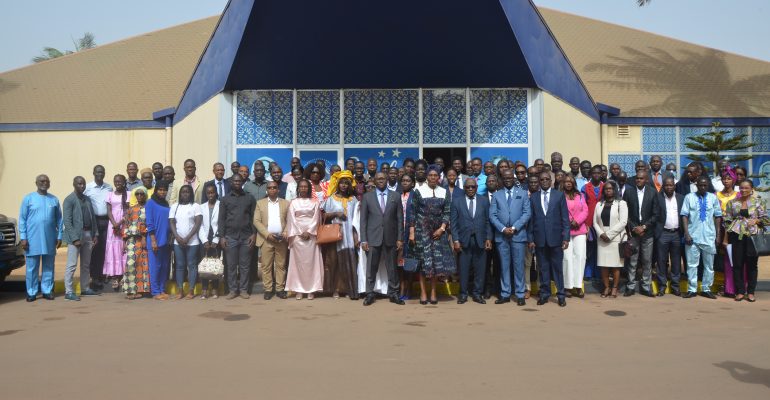ECOWAS COURT CONCLUDES OUTREACH CAMPAIGN IN GUINEA BISSAU WITH JUDICIAL DIALOGUE
Justice Gbéri-Bè Ouattara, Vice-President of the ECOWAS Court of Justice, urged Guinea Bissau’s judiciary to cooperate with the regional Court. The call was made at the meeting marking the conclusion of the ECOWAS Court of Justice’s awareness campaign in Guinea Bissau.
In a message addressed to the judges and members of the judiciary in Guinea Bissau, Justice Ouattara emphasized the need for improved mutual understanding and organization of their collaborative efforts. He highlighted several key points aimed at bolstering the judicial relationship between national courts and the regional body.
Justice Ouattara first stressed the importance of initiating a judicial dialogue. He told participants that the interaction would bridge gaps between the ECOWAS Court of Justice and Guinea Bissau’s national courts, ensuring both entities are synchronized in their jurisprudence and judicial processes. He reminded the audience of the coexistence of the dual legal orders – that of national courts and the ECOWAS community law. The Vice-President underlined the crucial role national judges play in understanding and implementing ECOWAS community law.
Furthermore, he explained the concept of “Recours préjudiciel” which allows domestic courts to seek clarifications from the ECOWAS Court of Justice on matters of community law interpretation. However, the Vice President noted that the procedure had not been utilized by any of the national courts of the Community.
Justice Ouattara emphasized the necessity of cooperation between the ECOWAS and national courts. He outlined the distinctive roles each institution plays within the regional legal ecosystem. He asserted that the Abuja-based court was not an appellate to the national courts and, as such, did not reconsider or overturn their decisions. He said the distinction was essential to understanding that there was no hierarchical relationship or jurisdictional conflict between them.
Justice Ouattara also told participants that the mandate of the ECOWAS Court was to ensure the observance of law and the principles of equity in the interpretation and application of the provisions of the Revised Treaty and all other subsidiary legal instruments adopted by the Community. He further noted that among the four mandates of the ECOWAS Court, the human rights protection mandate accounted for the greatest number of cases submitted. He also told participants that, while the regional court addressed human rights matters, it relied on the cooperation of national courts to give effect to its decision.
In an earlier speech, Justice Arafan Mané, Vice-Président of the Supreme Court of Guinea Bissau lauded the commitment of the ECOWAS Court to the protection human rights.
He commended the Court for its ongoing efforts to bring justice closer to the people of West Africa, congratulating the Court for the amendment of its protocol in 2005, which has been instrumental in enhancing its accessibility and reinforcing its mandate to protect human rights.
He also praised the Court for its impact on transforming lives through its jurisprudence across the continent and that constitutional order was maintained both nationally and regionally, despite facing occasional challenges. He offered the commitment of the Guinea Bissau judiciary in fostering more effective collaboration
The sensitization campaign in Guinea Bissau ended on Friday, 23rd February 2024 with a press conference by the Court’s Vice President, Justice Gberi-be Ouattara who used the opportunity to praise the host government for its support for the campaign.

